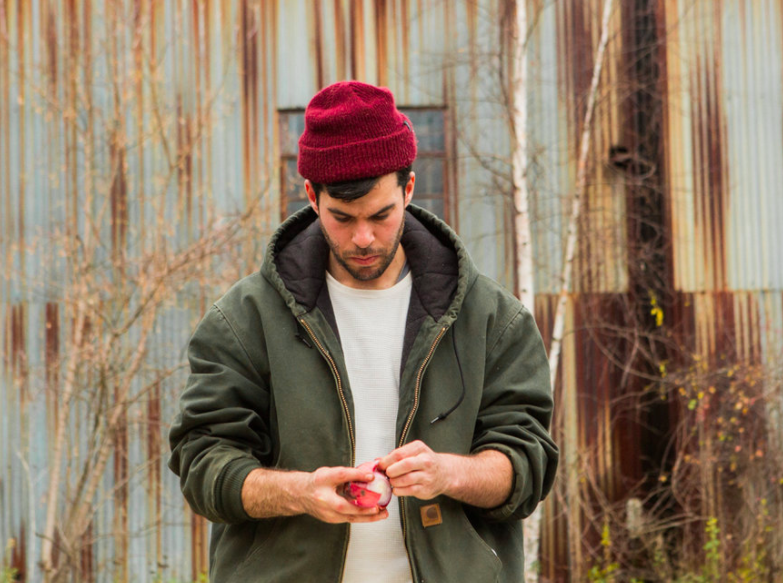Joint Venture
An Interview with founder Danny Newberg
By Kristen Tauer
When I met up with chef Danny Newberg on a recent Sunday afternoon at Abraço in the East Village, he had recently returned from a trip to Mexico (I had to go there for a wedding, so I was, like, "I might as well do a dinner," he explained) and was in the thick of the holiday dinner party season. Formerly the sous chef at Estela — he's also worked in the kitchens of Isa, Aldea, and Momofuku Ko — he broke off from the traditional back-of-house scene to do his own thing. He started Joint Venture in 2015, a collaborative and nomadic pop up dinner series that builds on his work as a private chef, and takes him into other people's kitchens.
Kristen: How did you get started with Joint Venture? Why did you decide to break off and do your own thing?
Danny: It goes way back to being in New York awhile and working in restaurants, and always getting burnt out — the same feelings over and over in the back of my head. After two or three years of living in New York, I knew there's gotta be a better way than a formal restaurant — I didn't know what it was, but I knew there was a better way. I couldn't just pick myself up and go back to work for someone, so I wanted to open my own restaurant because that's the next — I don't know, I kind of went with the flow instead of going with my gut of "something else."
But searching for a restaurant with Nialls [Fallon] — a partner of Joint Venture in the beginning — we just frequently talked about how hard certain things were going to be. He owned Maiden Lane at the time. "How are we going to do this and still be happy?" In the meantime of looking for restaurants, we were doing pop ups, and we were, like, "Maybe we should just do pop ups, forget about the restaurant." This was on the path of my original idea.
Kristen: Yea real estate in New York is brutal.
Danny: Real estate in New York city isn't made for selling small plates of food for 10 dollars. So it just didn't make sense, and we wanted to do a pop up that had more meaning, and make it into a business.
Kristen: Are you still looking for a restaurant space?
Danny: That was phased out. So many spaces are so expensive and — you're working with a basement where you can't stand up fully, it's 600 square feet. It's not your proper dream of a restaurant. I didn't want to settle for something that was sub par.
Kristen: What's your process for Joint Venture, do you approach other chefs about doing a pop up?
Danny: Being in New York for so long, I just know a lot of people, and have a lot of friends who are doing the same thing. It's more natural ways of finding dinners. In the very beginning, my friend Nick, who owns Alameda, came to one of the dinners, and afterwards was, like, "You're going to do one here." That has just kind of snowballed. It's not me going up to someone I don't know and asking to do a dinner, or someone I don't know emailing me. It's always we're around food, we're talking, it just happens.
Kristen: So are people pretty open about letting you into their space?
Danny: For the most part. The people who are drawn to me, and vice-versa, it's about learning and collaborating, and just working with people you respect and having fun with them.
Kristen: How do you come up with the themes for each pop up?
Danny: The theme is more the brand, it's not crazy. It's all the same — it's seafood, trying to be over fire, spicy. Picking Mexico, I had to go there for a wedding, so I was, like, "I might as well do a dinner." There are so many people in this city that just have friends everyone. My friend sent one email and this girl [in Mexico] was, like, "Yea, we're going to host you guys." They were great people, and took me all around Mexico City and to markets.
Kristen: Was it hard to source ingredients there?
Danny: I was working with a lot of things I've never tasted or seen before, like mostly wild products. I worked with this guy Hugo, showed him the menu and talked about myself, how I cook, and I was, like, "Look, these are the ideas, but just find the best ingredients and we'll remake the menu." He did a great job showing me the way with that, buying interesting stuff. He made us these beetles that he bought live, and toasted them. They tasted like flowers — pineapple, floral. So I tasted some things I've never tasted before.
Kristen: What's the biggest difference between working in a restaurant and doing your own thing, in this context?
Danny: To me, it's everything. I want to have fun, I get to switch things up all the time. I get bored with doing the same thing over and over.
Kristen: That sounds like a big perk, you get so many different experiences.
Danny: Yea. We did a children's art camp last summer, that was in Western Massachusetts in a sheep pasture, no water and no electricity, so I just cooked over fire. It was definitely the best thing I've ever done. And the woman who ran the camp, the way she did it was there were no snacks at all for the kids, I cooked three meals a day, and she did not want me to cook children's food, she wanted me to cook my food. They were camping in tents, their only shower was going to the lake. There were sheep walking around you...There was a rooster that attacked a girl, and we killed that and ate it.
Kristen: What are some ingredients that you're excited about working with currently?
Danny: Right now, greens and stuff — there's one farm at the market, they have these radicchios and Tardivos, just insane bitter, sweet, crunchy greens. They're so beautiful and so flavorful, and the texture is so cool. There's a lot of really good grains at the market, ancient grains like different kinds of farros and buckwheat and acorn berries. They're grinding all of them to make crushed flours. Apples and pears are so good. Chinatown has persimmons that are also really good.


